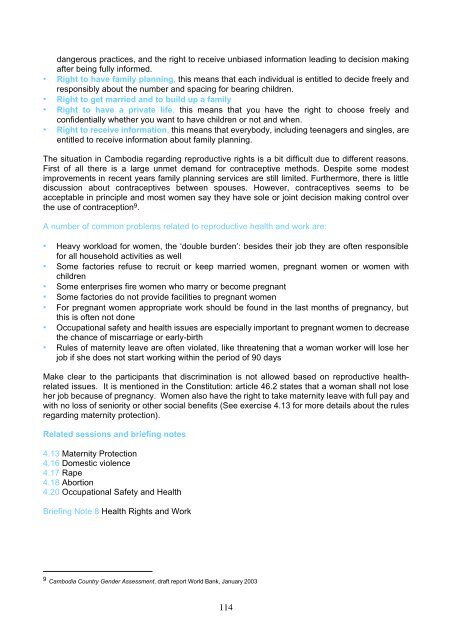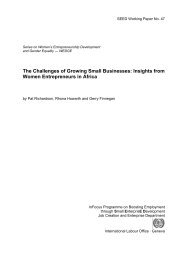manual: women workers' rights and gender equality - International ...
manual: women workers' rights and gender equality - International ...
manual: women workers' rights and gender equality - International ...
Create successful ePaper yourself
Turn your PDF publications into a flip-book with our unique Google optimized e-Paper software.
dangerous practices, <strong>and</strong> the right to receive unbiased information leading to decision making<br />
after being fully informed.<br />
• Right to have family planning, this means that each individual is entitled to decide freely <strong>and</strong><br />
responsibly about the number <strong>and</strong> spacing for bearing children.<br />
• Right to get married <strong>and</strong> to build up a family<br />
• Right to have a private life, this means that you have the right to choose freely <strong>and</strong><br />
confidentially whether you want to have children or not <strong>and</strong> when.<br />
• Right to receive information, this means that everybody, including teenagers <strong>and</strong> singles, are<br />
entitled to receive information about family planning.<br />
The situation in Cambodia regarding reproductive <strong>rights</strong> is a bit difficult due to different reasons.<br />
First of all there is a large unmet dem<strong>and</strong> for contraceptive methods. Despite some modest<br />
improvements in recent years family planning services are still limited. Furthermore, there is little<br />
discussion about contraceptives between spouses. However, contraceptives seems to be<br />
acceptable in principle <strong>and</strong> most <strong>women</strong> say they have sole or joint decision making control over<br />
the use of contraception 9 .<br />
A number of common problems related to reproductive health <strong>and</strong> work are:<br />
• Heavy workload for <strong>women</strong>, the ‘double burden’: besides their job they are often responsible<br />
for all household activities as well<br />
• Some factories refuse to recruit or keep married <strong>women</strong>, pregnant <strong>women</strong> or <strong>women</strong> with<br />
children<br />
• Some enterprises fire <strong>women</strong> who marry or become pregnant<br />
• Some factories do not provide facilities to pregnant <strong>women</strong><br />
• For pregnant <strong>women</strong> appropriate work should be found in the last months of pregnancy, but<br />
this is often not done<br />
• Occupational safety <strong>and</strong> health issues are especially important to pregnant <strong>women</strong> to decrease<br />
the chance of miscarriage or early-birth<br />
• Rules of maternity leave are often violated, like threatening that a woman worker will lose her<br />
job if she does not start working within the period of 90 days<br />
Make clear to the participants that discrimination is not allowed based on reproductive healthrelated<br />
issues. It is mentioned in the Constitution: article 46.2 states that a woman shall not lose<br />
her job because of pregnancy. Women also have the right to take maternity leave with full pay <strong>and</strong><br />
with no loss of seniority or other social benefits (See exercise 4.13 for more details about the rules<br />
regarding maternity protection).<br />
Related sessions <strong>and</strong> briefing notes<br />
4.13 Maternity Protection<br />
4.16 Domestic violence<br />
4.17 Rape<br />
4.18 Abortion<br />
4.20 Occupational Safety <strong>and</strong> Health<br />
Briefing Note 8 Health Rights <strong>and</strong> Work<br />
9 Cambodia Country Gender Assessment, draft report World Bank, January 2003<br />
114

















